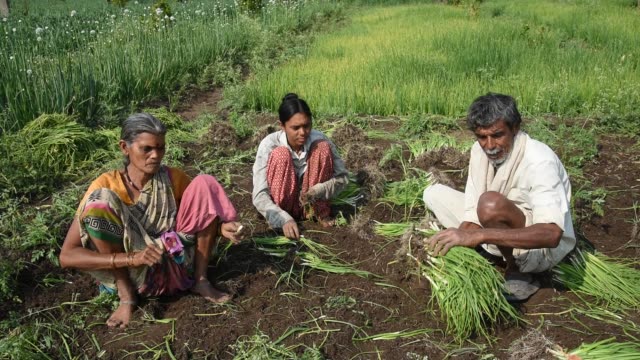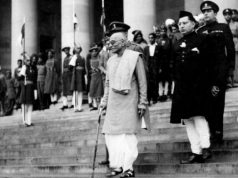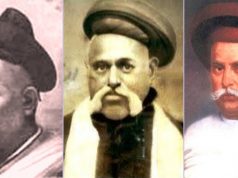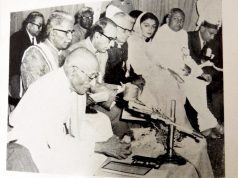Democracy and self-government mean considerable responsibility for every citizen. Unfortunately, we have come to feel that as long as Mr. Nehru is there, none of us need worry about anything. In the first place because he is a very good man; in the second place because we cannot do anything. We have lost the habit of thinking independently. Somehow or other and for some reason or other, we have become indolent in the matter of thinking, and that is the greatest difficulty in getting Government to do the right thing when we do not agree with what the Government is doing. But I shall not dwell on this because I do not want to encourage that habit but rather to discourage it. We must get out of this atrophy of thinking if we wish to achieve anything. We must think independently, rightly or wrongly – it does not matter. If everybody began to think freely – and that is the meaning of freedom, ultimately – we shall get something done. But if we get frightened of thinking itself or too lazy to think, handing over all responsibility to the men who brought us freedom, to carry on the administration of the country as they think fit, it is a dangerous situation. Now I wish to tell you something.
Megalomania – strong word – has vitiated our planning. If only our rulers had been more humble than they are, we would not have gone so badly, we would not have gone so wrong. It is the megalomaniac ambition that is at the root of all the inherent errors that are now showing themselves in heavy and distressing measure without giving us time even to wait. Pandit Nehru sees India “standing up on the top of golden hours and human nature is seeming born again.” That is how he sees things. But some of us, standing on the ground, with our feet on the ground, see differently. We see bankruptcy in the horizon. The sorry picture of our country as a chronic beggar before the Western nations. This is not pleasant and we feel distressed. Large dreams are no consolation for immediate calamity. But that is the thing that is keeping the Government of India in their present adventure. I shall not cover very wide ground after these general remarks. I wish to confine myself to the most urgent single problem of the day, viz., the deficit in food production. That is the basic necessity of our teeming millions, and deficit in food production is a very serious matter. Now what is the Government proposing to do about it? Compulsory transfer of land from the larger owners to cultivators who have to begin with debt. That is the main policy of what is called the Nagpur resolution – the switch-over from individual ownership to multiple ownership and multiple management. The word “Joint” is a misleading word. “Joint” has a sweet flavour about it. “Co-operation” has a very sweet flavour about it. We can easily be deceived by the phrases “Joint farming and “Co-operative farming’. It looks very odd that any one should oppose co-operation. Therefore, we should understand what it really is, and why we really object to it. In my phraseology I would call it multiple ownership and multiple management. Now do you think that multiple. ownership will produce good results? Do you think that multiple management will produce good results? It was long ago found that too many cooks spoilt the broth. This is vivid description of multiple management. It is bad enough to spoil a single meal, but it is worse to spoil all food production on that basis. Now that is what I understand to be the public policy now with regard to food production. Do away with individual management and introduce multiple management and multiple ownership. Now that leads necessarily to a new bureaucracy having to be created for the management of land. We have done with one kind of bureaucracy for the management of public offices. We shall hereafter have to deal with bureaucracy which manages the cultivation of land. Because the inherent weakness of multiple management is that they will look to Government to supply an efficient manager, and therefore we shall have a new bureaucracy, subsidies, interest-free loans, and at every crisis looking up to Government for assistance. Now do you think that this will lead to a rise in the production of food? It will, immediately-my telescope tells me – lead to a fall in food production and when we can ill-afford to bear such a fall in food production. In fact, what we want eagerly is a rise in food production, not 40%, not 5O%, – some little rise at least is what we want but instead the present policies, if everything is going to be given effect to, will lead to a considerable fall in food production. But my telescope may be wrong; I may be looking at it from the wrong end possibly. If the Prime Minister thinks that this kind of new management of land – taking over land from those who have it now and handing it over to multiple owners and multiple management through a bureaucracy – will ever lead to a rise in the food production, I think, he will soon be disappointed. The general plans, the plans produced by the Planning Committee-all these have already accentuated the rise in prices all round before starting to give any expected results from the plan. Now the policy of acquisition of land to satisfy the doctrine of multiple ownership will add to the inflation because, unless the intention – I would like you to follow me here with some attention – is to expropriate the present owners, discarding the principles of the Constitution, money will have to be issued by Government to meet the demands for compensation and wherefrom wilI they get that money? The new owners have no money to give. They are indeed selected on that basis. There are people here who know the secrets of money. Money is not you know what we all understand it to be. It is a piece of paper that is printed in Nasik. There will be plenty of money available to give as compensation to all those land owners from whom land is to be taken; or, if people do not like the look of the Nasik paper, they will be given Bonds, Government Bonds. In any case, it will add to the total amount of money in circulation; and the natural result of converting ownership in land into money is to add to the inflation that we already have. I may be wrong, but that is what I think, and if that inflation is to be accompanied by a fall also in food production, you can imagine the result. And what is all this for? The object being a dogma of equalisation of social happiness. Instead oi equalising social happiness we shall have a fall in food production.
Let us talk in concrete terms. Social happiness is a vague affair but food production is a very concrete thing, and when that is reduced you may easily go on thinking further as to whether we can have happiness. We may not have any happiness in a small measure, or in big measure or in equal measure or in unequal measure. The interference of the Government in other matters may be tolerated but if they begin to interfere in agriculture – it is a very sensitive and delicate thing- it will damage the plant at the root. And the industry, as it is even now, is maintained by long tradition and the pressure of poverty in the country. When that is interfered with by the Government for the sake of offering incense to some doctrine or dogma, the situation will be – it is an understatement to say – dangerous. The present owners of land, whether they are small or whether they are big, ask for no subsidy from Government. The good prices that food grains now fetch are acting-as an incentive to agriculture. But now the atmosphere of total uncertainty that the Government policies and the Government adumbrations of policies have created – the total uncertainty that has been created – has destroyed incentive in agriculture to a very great extent. People who are devoting and who are likely to devote much more attention if they are left alone have been rendered hopeless about it, uncertain about it, and they do not propose to take any further interest in agriculture. Is it a good thing? It is one of the most important problems before the country.
Again, take another thing. Can there be anything more foolish (I have already warned you that I will use harsh terms) than the idea that the State should take up trading – State Trading. Of course, the Gujarati proverb puts it very nicely and briefly. But some of you may not understand Gujarati. The proverb is that “when the State takes to trade, the people take to begging”. Now is there any justification for the exaggerated fears that are deliberately propagated about hoarding and cornering? Look at the situation. We have a large body of people, who are eager to compete and to share in the profits of trading in food grains. We have a very large body of people engaged and willing to be engaged in competing with one another in wholesale business and in retail business. Competition is the best security for the consumer. And if the State stops this competition and takes over the business, will there be any freedom for the consumer? Look at the nature of the commodity. The bulky nature of the commodity of food grains should be kept in mind before you talk about hoarding and cornering and things like that. The nature of the commodity is such that it will deteriorate, the rats and the mice will attack it, and the moths will attack it, if it is secreted and kept for a long time. Under these circumstances, if there is free competition among a large class of people who are not well off, who all want to make something out of it, and who are ready to compete with one another in the wholesale business and in the retail business, is there any likelihood of the consumer being cheated? I think the stories of cornering and hoarding have been greatly exaggerated when related to the food grains. In food grains the quality is such that we need not be afraid. Therefore, State Trading in food grains has no justification. Look at the other result. It will put gut of employment those who are now doing the work of distribution on the most frugal terns. Compare the position of any member of the bureaucracy-even the lower division clerk, if you like. How frugally the shop-keepers do their work, how simply they live, and how vigilant and just they are. We should have industries started to accommodate and give work for all these people before you deprive them of their occupation. When these people are dividing the profits of trade in a fair way, they are doing unconscious socialism which you want to introduce by legislation. The profits in the trade are divided among so many people. Why do you stop that division before you create industries to absorb those people. It is not a good thing to put the cart before the horse, and that is what is being done.
Every day we read about astronomical figures of money to be raised in order to relieve unemployment. The other day somebody said that we want only Rs. 43,000 crores in order to relieve unemployment. Now let us not look at Rs. 43,000 crores; let us take only the Rs. 2,000 crores that has been proposed for taxation. When you go beyond a certain measure in taxation it will lead to retrenchment in every business – either closing down or retrenchment. Heavier and heavier taxation will lead to heavier and heavier retrenchment. And what will retrenchment lead to? It will lead to unemployment. It is something like filling up small pits by digging big pits somewhere else. You dig big pits by way of taxation and you try to fill the smaller pits with it. If you have two cooks you will have only one cook thereafter. If you have two clerks you will try to get the work done by one clerk; and that clerk will try to do less work than he was formerly doing. And that is what will be going on-inefficiency and retrenchment side by side.
Taxation is a dangerous thing when it goes beyond a certain measure. It is dangerous because it will lead men to dislike all government and improve deceiving skills.
Dr. Chandrasekhar has contributed a very interesting article which I read in the Neu: York Times in a recent issue. He described how Mao, in China, is waging war against the family in China. The stories about China and other Communist countries did not find much interest for us because they mere different countries having different way of life. But, today, now that the Government of India is going on the same road, what is described to be happening in China will happen – and is bound to happen – here also. So, there will be an attack on the family by and by. That is why Dr. Chandrasekhar’s description frightens some of us. In China, we are told, they are regularly carrying on a campaign – a campaign not in speeches and meetings; you know, the Communist ‘campaign’ is a campaign of getting things done-and they are getting the families dislocated and extinguished by mixing up people for all matters. Now that is why we have to protect the farm and the family.
I conclude with this remark that the time has arrived when we should protect the farm and the family against the inroads of a Totalitarian State.
An opposition based on this policy of farm and family protection is essential now – not necessarily for changing the Government at once. We need not change the Government but opposition will help to keep the Government in proper order. Reference was made to the 1962 elections coming. Don’t wait till then; don’t think about it at all; that is what I would say. We want an opposition in the country – whether it is in the Parliament or whether it is not in the Parliament – we want an opposition first in the country. We want an opposition thereafter in Parliament; and that opposition, starting from the country and going into Parliament, will keep even the present Government in good order. Their confused thinking will begin to settle down into orderly thinking. Otherwise, conceit and arrogance will grow feeding on itself.
This article first appeared in a booklet published by Forum of Free Enterprise in August 1959. The original document can be accessed here.
IndianLiberals.in is an online library of all Indian liberal writings, lectures and other materials in English and other Indian regional languages. The material that has been collected so far contains liberal commentary dating from the early 19th century till the present. The portal helps preserve an often unknown but very rich Indian liberal tradition and explain the relevance of the writings in today’s context.
Post Disclaimer
The opinions expressed in this essay are those of the authors. They do not purport to reflect the opinions or views of CCS.






